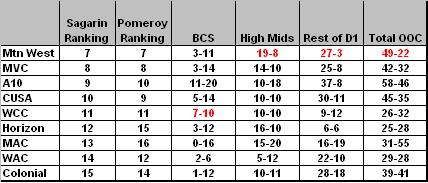Posted by rtmsf on December 11th, 2008
You may recall last week that we looked at how the power conferences (ACC, Big 10, Big 12, Big East, Pac-10, SEC) were doing halfway through the non-conference schedule this year. We generally concluded that the ACC and Big East are currently at the top of the heap, and the SEC in particular should be booted out of the group.

What Mid-Majors Play For
But what about the mid-majors? As important as the non-conference slate is for the BCS schools in terms of seeding and whether five or six teams are invited to the Big Dance, it’s even more important to the mid-majors who are fighting for simply a second or third bid and assuredly will see their conference RPIs drop once conference season begins. So today we take a look at evaluating the mid-majors’ performance thus far, keeping in mind the dual criteria for success that we established last week – considerable success against your peers and domination of your subordinates. We’ll add a third criterion for these mid-majors, which is a reasonable showing against your superiors (the power conference schools) as well. So let’s take a look at the W/L numbers thus far (through 12.11.08):

It seems clear to us right off the bat that the Mountain West (ranked #7 by both Sagarin and Pomeroy) has the best overall profile thus far. While it has struggled with its BCS record (.214), its measure in that category is only significantly worse than two conferences – the A10 (.355) and the WCC (.411) – in that regard. But the MWC has absolutely dominated its peer conferences (.704) and its underlings (.900) as if it were a power onference-lite (watch yourselves, SEC). It’s overall non-conference record is also outstanding for a mid-major, at 49-22 (.690), bettering its peers by a considerable margin (#2 – Missouri Valley – .583).
For the next best mid-major conference, we’re split between the Missouri Valley, Atlantic 10 and Conference USA. The A10 has a solid 11-20 (.355) record against the big boys, whereas the MVC (.176) and CUSA (.263) do not, but the MVC has performed significantly better against its peers (.583 vs. .357/.500, respectively). All three conferences have pretty well owned their subordinates this year. So how to distinguish the three? Let’s go with the top-heavy theory. According to Sagarin, the A10 has six teams in the top 100, the MVC has five, and CUSA has four. Good enough for us.

There’s a pretty clear delineation between these top four mid-majors and the others – WCC, Horizon, MAC, WAC, Colonial, but we’re not going to try to distinguish from among this group because it’s largely too close to call based on the above data. As it currently stands, it will be a struggle for any of these five conferences to put a second team into the NCAA Tournament this year (St. Mary’s needs to keep that in mind). Nevertheless, we do want to point out a few interesting observations that we had along the way.
- The MAC is 0-16 against power conference schools. You’re not going to be a mid-major very long playing like that. The Colonial is barely any better.
- The WCC is a respectable 7-10 against the power conferences, but lays an egg against the low-majors (9-12). We have to believe this shows just how top-heavy this conference is (w/ Gonzaga and St. Mary’s).
- The Horizon needs to play more games against D1 opponents – we can’t believe they’ve only played 12 games against the low majors (6-6).
We’ll check back in on this when we get to the end of the non-conference schedule, because at that point with few exceptions, conference positions are relatively static.
| rtc analysis
| Tagged: acc, bcs conferences, big east, colonial, conference usa, head to head, horizon, mac, mid-majors, missouri valley, mountain west, sec, st mary's, wac, wcc
Share this story















































